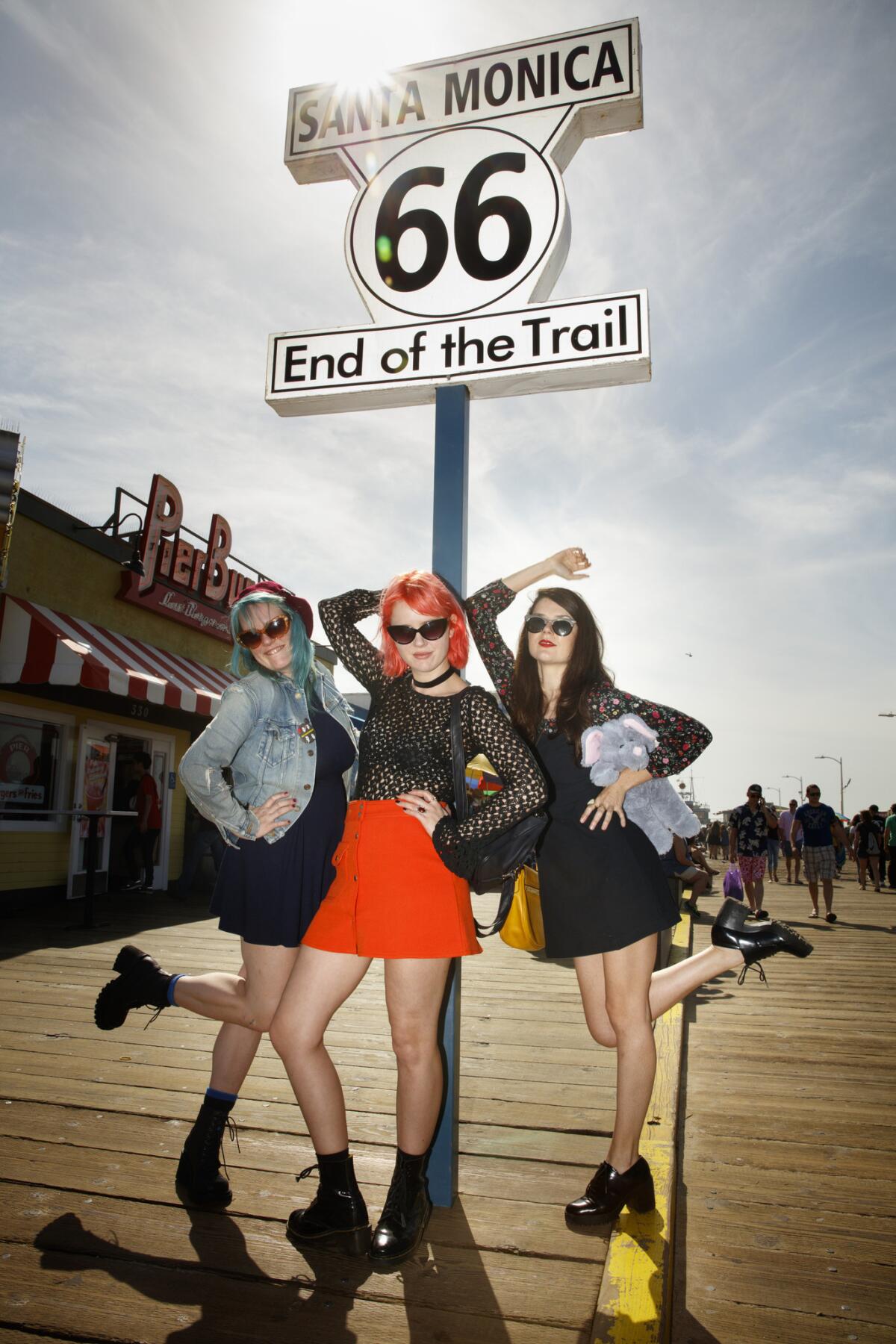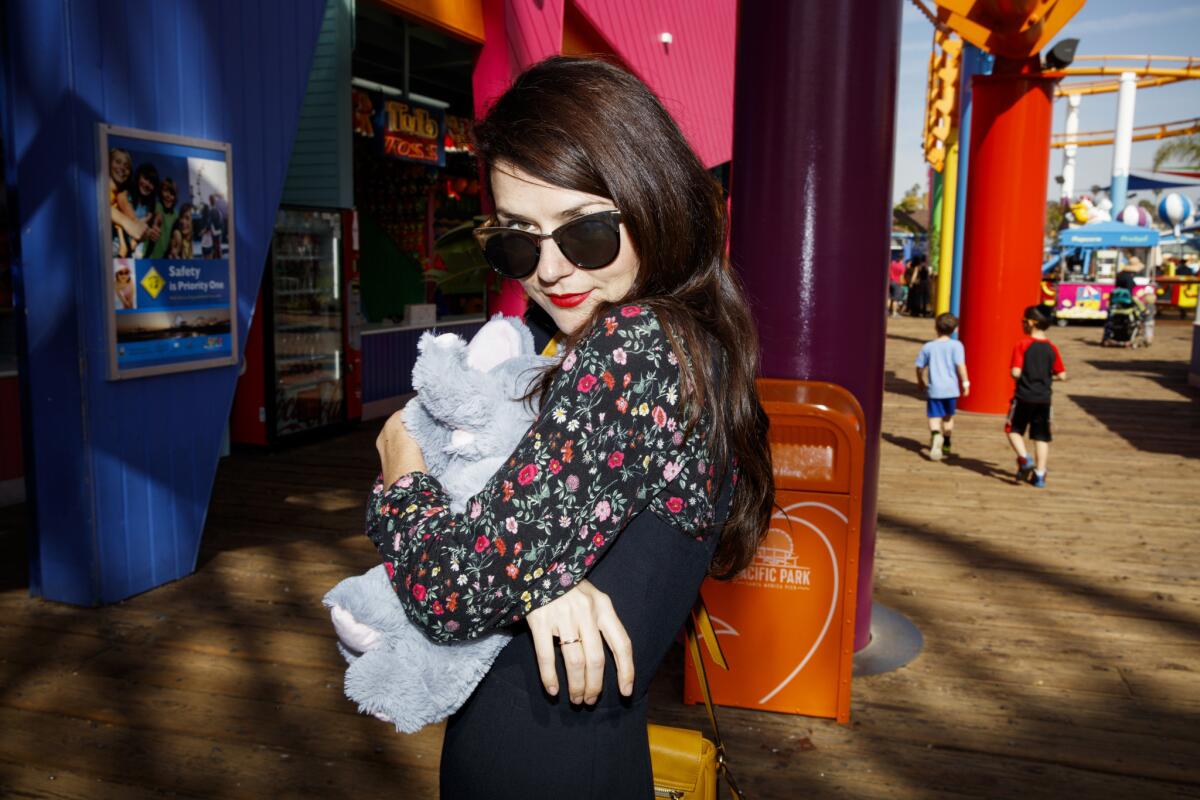Echo Park punk band Bleached embraces life’s darkness, with an almost beachy exuberance

The musicians of Bleached, Micayla Grace, left, Jennifer Clavin and Jessie Clavin, during a trip to the Santa Monica Pier
“I feel like being a punk,” says Jennifer Clavin, leader of the Echo Park-based trio Bleached, “meant we were almost anti-beach culture.”
Clavin is driving her band mates — her guitar-playing younger sister, Jessie, and bassist Micayla Grace — to the beach.
It’s a Friday morning, a few weeks before the April 1 release of the band’s second album, “Welcome the Worms,” a work that chronicles late nights and the mistakes that accompany them, with a shoreline-ready effervescence. Still, forget topics of surf and sand, Bleached’s new songs are set in clubs, bars or the cars of unknown men.
Today, Jennifer assures that the bratty, beach-hating days of her youth are behind her. “Welcome the Worms,” for instance, delivers its booze-filled recklessness with sobering exuberance. It’s highly melodic and often sunny. There’s even a spacey theramin if you know where to listen and plenty of “ba-bas” and “whoo-hoos,” although Grace confesses she wanted even more of them.
A friend of Jennifer Clavin’s described it as “evil Go-Go’s,” and she’s taken a liking to that. It’s also relatively accurate, because Bleached is steeped in a tradition of West Coast pop — only louder. Over the course of a few hours, Jennifer will mention the harmonies of Linda Ronstadt as often as she will the aggression of Black Flag.
And it’s sitting in traffic on the I-10, long before the ultimate destination of the Santa Monica Pier is reached, that Jennifer spies a metaphor for “Welcome the Worms.”
In the neighboring lane, a woman has her sedan decked out in balloons and banners as if she has just come from a wedding. Only it’s not a coupling that’s being championed: “Just divorced!” reads the scrawl on the rear window, and Jennifer is ill-advisedly struggling to both drive and take a Snapchat of it.
“That’s what the record is about, that way of looking at life,” she’ll say later. “It’s about embracing the darkness of life. That’s life. Life is scary. But there are beautiful moments that come of that darkness.”
“Welcome the worms,” says Grace.
If Bleached’s first album, 2013’s “Ride Your Heart,” was all busted relationships all the time, “Welcome the Worms” is celebratory in its self-reflection, even if Jennifer doesn’t always like what she sees. It’s also the best argument yet that Bleached is going to find a wider audience. Produced by Joe Chiccarelli, who’s worked with the likes of Elton John, Morrissey and the Shins, “Welcome the Worms” is punk rock at its most bubblegum, holding steadfastly to the belief that in this electronic-driven era, air-guitaring is still cool. The band, currently on tour, will be home May 5 to play the Teragram Ballroom.
Though Bleached is only two albums into its career, the Clavin sisters — raised in the San Fernando Valley and both high school dropouts — have been toiling in the L.A. music scene for more than a decade. In their teens, they started the thrashy, well-regarded Mika Miko, which, until splitting in 2009, was a regular at downtown’s hole-in-the-wall all-ages club the Smell.

Bleached on “Welcome the Worms” is punk rock at its most bubblegum. The band, from left, is comprised of sisters Jessie and Jennifer Clavin and bassist Micayla Grace.
In 2006, when Mika Miko’s members still weren’t all of drinking age and Jennifer told The Times she was 22, the band hooked up with Kill Rock Stars — the Olympia, Wash.-based record label that ignited the mid-’90s riot grrl movement. Yet Mika Miko, with its shouted, back-and-forth vocals, was not so interested in politics.
Though Jennifer and Jessie recovered from bolting high school for various L.A.-area community colleges, they sometimes tried to scrape together living expenses by attempting to score work as extras in Hollywood productions. This was reflected in Mika Miko’s songs — sort of.
“One was to be zombies. I didn’t get called back. How do you not get called back to be a zombie?” says Jennifer. “We got the call that we weren’t accepted while at practice, so we wrote a song called ‘Zombies Take One.’”
“In Mika Miko days, I would write a song about not getting called back for a casting call, but I would make the lyrics so vague that no one would know what I was singing about. I’d want them to think it was a love song or something. But that’s only because I wasn’t confident. I didn’t think anyone wanted to hear what I had to say.
“With Bleached, I’ve been as honest as I can be. What do I have to lose? Let’s get real.”
Bleached, especially on “Welcome the Worms,” is all about clarity. Ten songs and just over 35 minutes, it’s a work of speeding into and through your late 20s, of surviving dead-end relationships, broken friendships and learning how to say “forget-it-all” and to just go out and have a roller-skating party.
“I’m trying to be loud vocally and loud with my image,” Jennifer will say moments after a young woman at the Santa Monica Pier gushes over the musician’s cotton-candy hair color. “You want to make people question you. That’s why I dye my hair bright orange. I don’t want to be boring.”
Sitting at a chain restaurant and looking out over the Santa Monica Pier, Jennifer says she’s healthier than when she wrote and recorded “Welcome the Worms.” She’s drinking less, she says, and has learned how to stop using alcohol as a means to mask her nervousness. Earlier Bleached songs, she says, were about avoidance, her writing about the experiences of friends or others to distract from herself.
“This record I was trying to dig into myself,” she says. “I wanted to be like, ‘What am I doing wrong?’ I wanted to allow myself to really feel. Sometimes I hate myself.
“There are times where I hate everything and I can’t wait to go out later and get messed up and maybe just sleep with somebody. I’m just being honest. I let myself go through that hardcore. This record was that part of my life, and now I’m looking back at it thinking, ‘Oh, that was a really crazy time.’”
Grace, who still has a day job as a court reporter and was clutching a stuffed elephant won in a game of whack-a-mole at the pier’s amusement park, says Bleached’s songs are increasingly about growing up.

Bleached bassist Micayla Grace celebrates after winning a game of whack-a-mole at the Santa Monica Pier.
“A lot of people don’t want to feel pain, and you spend your life resisting it,” she says. ‘You can spend a whole life resisting one painful feeling — rejection or heartbreak or sadness — and not do anything that puts you in a vulnerable place. But you’re not escaping. You either avoid, or you feel.”
And while Bleached may say that it was once anti-SoCal beach culture, that’s not the full story.
There was a time when Jennifer was very much into it. After riding the Pacific Wheel (largely an opportunity for selfies) and Inkie’s Pirate Ship (a lesson for all concerned in how to survive motion sickness), Jennifer stops near the carousel.
Though earlier she and her sister had discussed days spent scouring YouTube for punk rock videos from the ‘70s and early ‘80s, Jennifer says it was while riding the carousel as a young teen at a friend’s birthday party that she first fell in love with music.
The song was Blur’s mid-’90s hit “Song 2,” with its rush of guitars and “whoo-hoo” hook. The combination of spinning with wind in her face and an irresistible melody at her back was one she couldn’t resist. It’s a sensation that found it way onto “Welcome the Worms.”
“We’re trying to channel the innocence we had before we discovered full party scenes and stuff,” she says.
“I want to be crazy when I’m not drinking,” she says. “It’s just about not caring. Why don’t we act crazy? It’s because we don’t want to look crazy.
“But who cares if we look crazy?”
More to Read
The biggest entertainment stories
Get our big stories about Hollywood, film, television, music, arts, culture and more right in your inbox as soon as they publish.
You may occasionally receive promotional content from the Los Angeles Times.











